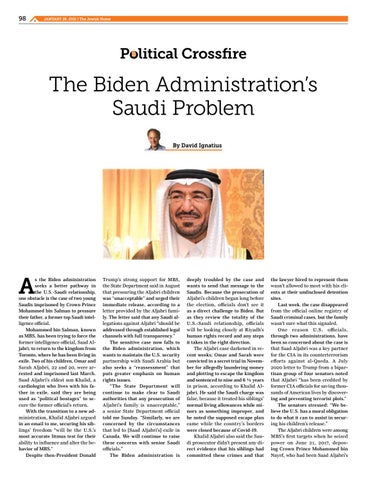4
OCTOBER 29, 2015 | The Jewish Home
98
JANUARY 28, 2021 | The Jewish Home
4
OCTOBER 29, 2015 | The Jewish Home
Political Crossfire
The Biden Administration’s Saudi Problem By David Ignatius
A
s the Biden administration seeks a better pathway in the U.S.-Saudi relationship, one obstacle is the case of two young Saudis imprisoned by Crown Prince Mohammed bin Salman to pressure their father, a former top Saudi intelligence official. Mohammed bin Salman, known as MBS, has been trying to force the former intelligence official, Saad Aljabri, to return to the kingdom from Toronto, where he has been living in exile. Two of his children, Omar and Sarah Aljabri, 22 and 20, were arrested and imprisoned last March. Saad Aljabri’s eldest son Khalid, a cardiologist who lives with his father in exile, said they are being used as “political hostages” to secure the former official’s return. With the transition to a new administration, Khalid Aljabri argued in an email to me, securing his siblings’ freedom “will be the U.S.’s most accurate litmus test for their ability to influence and alter the behavior of MBS.” Despite then-President Donald
Trump’s strong support for MBS, the State Department said in August that pressuring the Aljabri children was “unacceptable” and urged their immediate release, according to a letter provided by the Aljabri family. The letter said that any Saudi allegations against Aljabri “should be addressed through established legal channels with full transparency.” The sensitive case now falls to the Biden administration, which wants to maintain the U.S. security partnership with Saudi Arabia but also seeks a “reassessment” that puts greater emphasis on human rights issues. “The State Department will continue to make clear to Saudi authorities that any prosecution of Aljabri’s family is unacceptable,” a senior State Department official told me Sunday. “Similarly, we are concerned by the circumstances that led to [Saad Aljabri’s] exile in Canada. We will continue to raise these concerns with senior Saudi officials.” The Biden administration is
deeply troubled by the case and wants to send that message to the Saudis. Because the prosecution of Aljabri’s children began long before the election, officials don’t see it as a direct challenge to Biden. But as they review the totality of the U.S.-Saudi relationship, officials will be looking closely at Riyadh’s human rights record and any steps it takes in the right direction. The Aljabri case darkened in recent weeks; Omar and Sarah were convicted in a secret trial in November for allegedly laundering money and plotting to escape the kingdom and sentenced to nine and 6 ½ years in prison, according to Khalid Aljabri. He said the Saudi charge was false, because it treated his siblings’ normal living allowances while minors as something improper, and he noted the supposed escape plan came while the country’s borders were closed because of Covid-19. Khalid Aljabri also said the Saudi prosecutor didn’t present any direct evidence that his siblings had committed these crimes and that
the lawyer hired to represent them wasn’t allowed to meet with his clients at their undisclosed detention sites. Last week, the case disappeared from the official online registry of Saudi criminal cases, but the family wasn’t sure what this signaled. One reason U.S. officials, through two administrations, have been so concerned about the case is that Saad Aljabri was a key partner for the CIA in its counterterrorism efforts against al-Qaeda. A July 2020 letter to Trump from a bipartisan group of four senators noted that Aljabri “has been credited by former CIA officials for saving thousands of American lives by discovering and preventing terrorist plots.” The senators stressed: “We believe the U.S. has a moral obligation to do what it can to assist in securing his children’s release.” The Aljabri children were among MBS’s first targets when he seized power on June 21, 2017, deposing Crown Prince Mohammed bin Nayef, who had been Saad Aljabri’s























